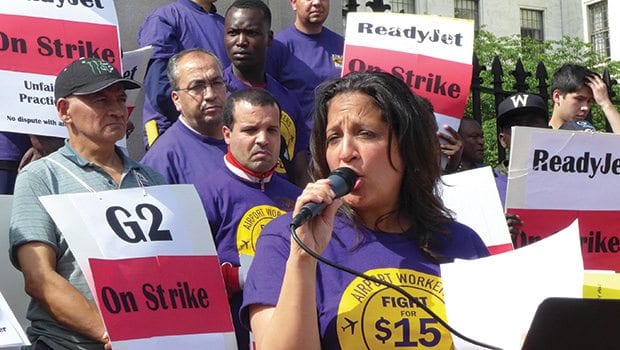
A group of Logan airport workers staged a 24-hour strike and State House demonstration last week to protest what they say are illegal business practices and subpar workplace conditions under their employers, ReadyJet Inc. and G2 Secure Staff, LLC.
The two companies contract with a number of airlines, including JetBlue, US Airways and Delta. The workers’ main complaint centered on what they said were intimidation tactics, including firing, used against Logan airplane cleaner and baggage workers who are trying unionize.
“One year ago, they did a public vote count to demonstrate support for unionization,” said Roxana Rivera, Vice President of the 32BJ SEIU union, which is supporting the workers in their efforts.
“It was overwhelming [in support],” she said.
Still, she said, the workers faced obstacles.
“The companies are continuing to break the law,” she said. “They are not respecting workers’ right to organize. They are actively trying to stop it.”
The protesters cited corporate illegal practices that are chronicled in a number of litigation cases, both past and present. Workers, in conjunction with 32BJ SEIU, have submitted testimony to the Occupational Safety and Health Administration alleging that ReadyJet illegally terminated employees who attempted to unionize. Protesters claim that ReadyJet has fired over a third of its Logan workforce since January 2014. The OSHA investigation is currently pending.
NLRB investigates
“ReadyJet managers have subjected workers to unfair labor practices including illegal surveillance and threats, impeding their ability to organize to improve conditions. In some cases, these incidents were related to workers raising concerns about security and health and safety problems they had witnessed,” said SEIU spokesperson Eugenio Villasante in an email to the Banner.
The National Labor Relations Board also is involved in various complaints against the two companies. On May 29, the NLRB issued a complaint against G2 Secure Staff based on charges from the SEIU alleging that the company’s employee handbook misled workers about their rights to organize. A hearing on that complaint is scheduled for September 2, 2015 in Boston’s federal courthouse before an administrative judge of the NLRB, according to NLRB documents.
Similarly, on April 30 the NLRB issued acomplaint against ReadyJet. A hearing on that is scheduled for September 9, 2015, according to NLRB documents.
State House protesters also cited past OSHA and NLRB citations against both companies that involved workplace safety. In a case from June 2014, OSHA fined ReadyJet almost $30,000 for violations that included failing to provide proper cleaning equipment to employees cleaning up lavatory waste.
(According to a statement from protesters, two of those citations were removed and the fine was lowered to $2,000 after the company agreed to remedy some viola¬tions.)
Additionally, in July 2014 the Massachusetts Attorney General’s office ordered ReadyJet to pay employees $13,045 in restitution for illegal wage deductions after concluding that the company deducted money from 226 workers’ paychecks over a two-year period to pay for TSA badges and uniforms.
“Enough is enough and they need to stop breaking the law,” said Rivera.
Last week’s protest was designed to last just 24 hours, after which organizers expected a smooth return to work.
“We expect the companies will allow them to return to work,” Rivera said at the protest.
She added that in addition to legal concerns about organizing, workers wanted improved conditions overall, including better wages. She said although recent improvements such as a one-dollar increase in the airport’s minimum wage had taken place, they were not enough.
“It was the first time workers had seen a raise in many years,” she said. “But workers need more. They need to not be working full time and yet not be able to rent an apartment.”
Several elected officials came to express their support.
“This is about dignity and respect,” said state Rep. Adrian Madaro of East Boston. “We have a lot of workers at the airport [in East Boston] and they are not being treated fairly.”
Jeff Crosby, President of the North Shore Labor Council, pointed a finger at the airlines.
“American Airlines, Delta – they like to hide behind their subcontractors,” he said. “We know these corporations control the contractors, and they control what they do.”
Verbal intimidation
Representative Dan Ryan made an historical analogy, tying the rally to the story of Bunker Hill Day, which was that same day.
“You are representing your patriotic duty to hold those who represent you accountable,” he said to the crowd.
“The American Revolution started out as an economic issue,” he added, referring to the Boston Tea Party wherein colonialists threw British tea into the city’s harbor to protest their motherland’s taxes.
A week later, 32BJ SEIU spokesperson Eugenio Villasante told the Banner that there had been no response yet from the companies regarding the protesters’ demands. He did, say, however, that he learned from some employees that they had faced verbal intimidation.
“Some workers have said their supervisors have communicated with them about the strike,” he said. “They said they shouldn’t have gone on the strike, and this is not something they should do — and that’s not correct,” he said, emphasizing the legal right of employees to strike.
When the Banner called the ReadyJet corporate office for comment on this story, a woman who answered the phone in the Human Resources department (the company’s automated answer machine does not have a dial option for media inquiries) said “We have no comment” and hung up after the reporter identified herself. A voicemail left in another inbox option provided by the automated message was not returned.
When the Banner called G2 Secure Staff’s office in East Boston, a woman there said an appropriate press person would return the Banner’s call “if someone is available.” As of press time, G2 did not call back.






